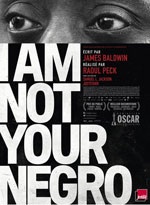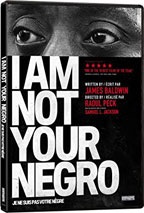Je ne suis pas votre nègre
-
Réalisé par Raoul Peck • Écrit par Raoul Peck
-
France, États-Unis, Belgique, Suisse • 2016 • 90 minutes • Couleur et Noir & Blanc
- Réalisation :
Raoul Peck - Écriture :
Raoul Peck - Image :
Henry Adebonojo, Bill Ross IV, Turner Ross - Son :
Valérie Le Docte, David Gillain - Montage :
Alexandra Strauss - Voix off :
JoeyStarr - Musique originale :
Alexei Aigui - Documentaliste :
Marie-Hélène Barberis
- Production (structure) :
Velvet Film - Coproduction :
Artemis Productions, Close Up Films - Diffuseur :
ARTE France, RTS - Radio Télévision Suisse, RTBF - Radio Télévision Belge Francophone - Ayant droit :
Velvet Film
- N° ISAN :
non renseigné
Résumé
À travers les propos et les écrits de l’écrivain noir américain James Baldwin, Raoul Peck (L’Homme sur les quais, Lumumba) propose un film qui revisite les luttes sociales et politiques des Afro-Américains au cours de ces dernières décennies. Une réflexion intime sur la société américaine.
In 1979, James Baldwin wrote a letter to his literary agent describing an unavoidable endeavor he was about to embark on: the writing of his last book, Remember This House. The book would be an account of the lives and successive assassinations of three of his friends — Martin Luther King Jr., Medgar Evers and Malcolm X. Their murders permanently traumatized an entire generation. James Baldwin was never able to go beyond 30 pages before he died. The manuscript, Notes toward Remember This House, was entrusted to Raoul Peck by the executor of The James Baldwin Estate. Raoul Peck reclaims James Baldwin’s quest and will lead us along the complex political road of these three “memorable” lives, using only Baldwin’s own words. By confronting the deeper connections between the lives and assassinations of these three men we uncover a larger narrative of America’s historical and current denial and irrational relationship with race. This “history of violence” (that Martin Luther King Jr., Medgar Evers and Malcolm X paid with their lives), the created image of what it means to be Black and the long simplified narrative that Hollywood recounts as a story between “good” and “evil” or “right and wrong,” reflects our current racial precariousness.
Mot(s)-clé(s) thématique(s)
Sélections et distinctions
- 2019 • Emmy Awards • Los Angeles (États-Unis) • Emmys Award - Catégorie Documentaire Art et Culture
- 2018 • BAFTA - British Academy of Film and Television Arts • Londres (Royaume-Uni) • Meilleur Documentaire
- 2018 • Images en bibliothèques • Paris (France) • Film soutenu par la Commission nationale de sélection des médiathèques
- 2018 • Les Césars - Académie des Arts et Techniques du cinéma • Paris (France) • César du Meilleur Film Documentaire
- 2017 • FIFDH (Festival du Film et Forum International sur Les Droits Humains) • Genève (Suisse) • Compétition Documentaires de Création
- 2017 • Millenium - Festival international du documentaire • Bruxelles (Belgique) • Panorama "Parcours de Vie"
- 2017 • Festival international du film de Berlin - Berlinale • Berlin (Allemagne) • Panorama Documentaires
- 2017 • Oscars • Los Angeles (États-Unis) • Nomination pour le meilleur documentaire
- 2016 • Philadelphia Film Festival • Philadelphia (États-Unis) • Best Documentary Feature Award
- 2016 • Chicago International Film Festival • Chicago (États-Unis) • Audience Award for Best Documentary
- 2016 • New York Film Festival • New York (États-Unis) • Sélection
- 2016 • Toronto International Film Festival (TIFF) • Toronto (Canada) • Sélection TIFF Docs






